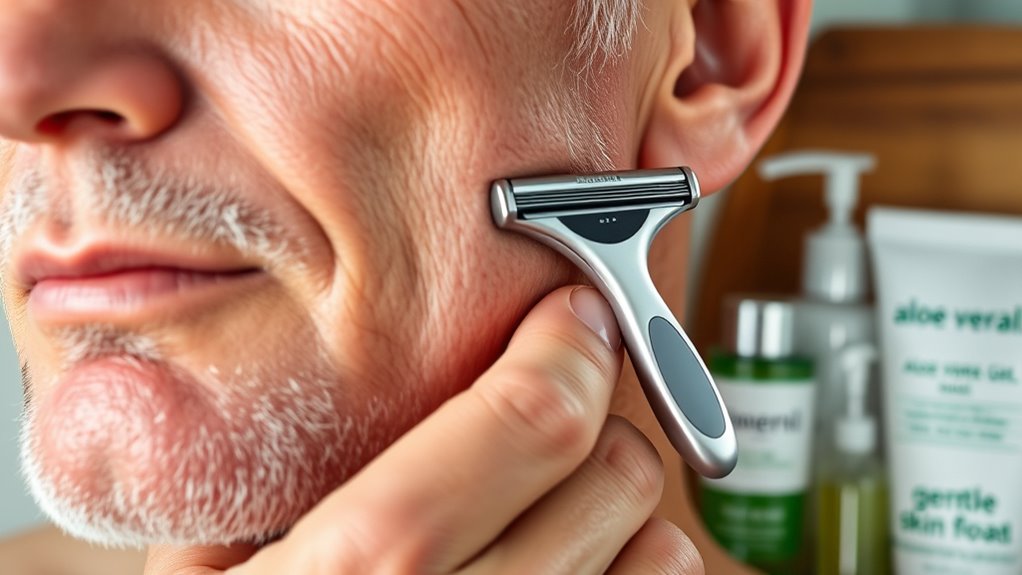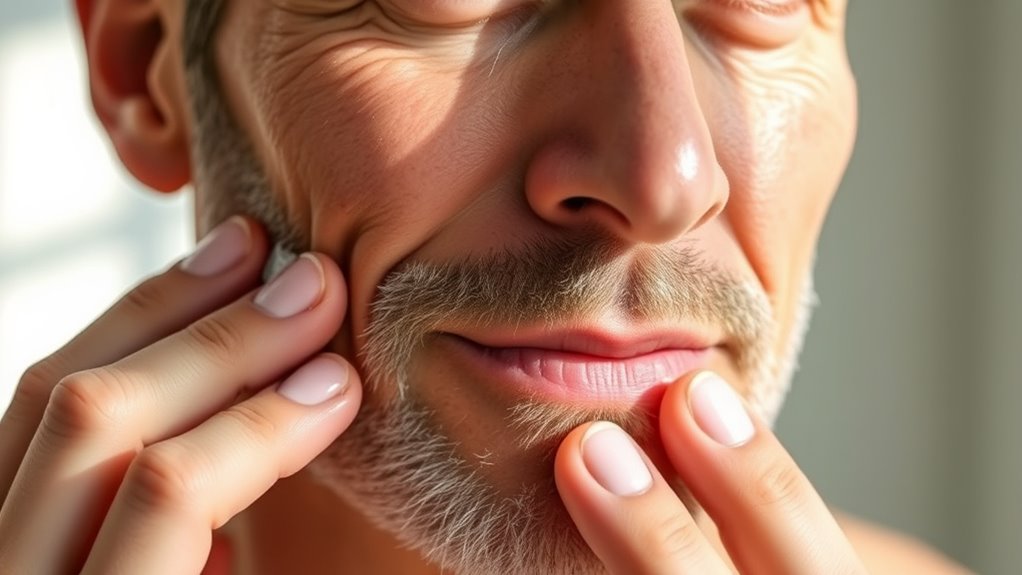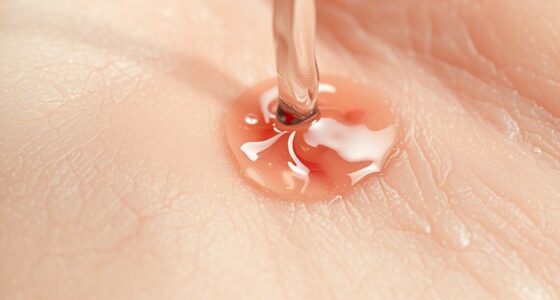To protect your sensitive skin, choose gentle, hypoallergenic shaving products and prepare your face with warm water and a pre-shave oil. Use a sharp razor designed for sensitive skin and shave with slow, gentle strokes without pressing hard. Afterward, soothe your skin with aloe vera or lavender-based products, avoiding alcohol-based after-shaves. Maintaining proper techniques can make your shave more comfortable—keep exploring for more tips to keep your skin healthy and irritation-free.
Key Takeaways
- Use gentle, hypoallergenic shaving products designed for sensitive skin to reduce irritation.
- Prepare skin with warm water and pre-shave oil, and trim hair regularly for easier shaving.
- Shave slowly with a sharp razor, using short, gentle strokes without applying pressure.
- Choose razors with protective barriers or multiple blades suited for sensitive skin.
- Follow up with soothing, alcohol-free after-shave products like aloe vera or lavender-infused lotions.
Choose Gentle, Skin-Friendly Shaving Products

Since senior skin can be more delicate and prone to irritation, it’s essential to choose shaving products that are gentle and designed for sensitive skin. Look for products labeled with sensitive skin formulations, which are specifically created to minimize irritation and discomfort. Hypoallergenic ingredients are a must, as they reduce the risk of allergic reactions and soothe your skin during shaving. Avoid products with harsh chemicals, artificial fragrances, or dyes, which can aggravate sensitive skin. Instead, opt for creams, gels, or foams formulated to be gentle and nourishing. Using the right shaving products helps protect your skin’s natural barrier, reduces redness, and prevents razor burn. Selecting skin-friendly options makes shaving a safer, more comfortable experience for your sensitive skin. Additionally, proper storage of your shaving products can help maintain their effectiveness and skin compatibility over time.
Prepare Your Skin Properly Before Shaving

Before you start shaving, take a few moments to prepare your skin to minimize irritation and guarantee a smoother shave. Pre shave skincare is essential, especially for sensitive senior skin. Begin by washing your face with warm water to open pores and soften hair. If needed, apply a gentle pre-shave oil or lotion to create a protective barrier and reduce friction. Keep in mind that shaving frequency matters; shaving too often can irritate delicate skin, so consider trimming hair regularly instead of daily shaving. Avoid rushing; patience helps prevent nicks and redness. Properly preparing your skin helps the razor glide smoothly, reducing irritation and discomfort. Taking these steps ensures a more comfortable, effective shave tailored for sensitive skin. Additionally, using an air purifier in your bathroom can help maintain a cleaner environment, reducing airborne irritants that may aggravate sensitive skin.
Use Proper Shaving Techniques to Minimize Irritation

To minimize irritation while shaving, it’s essential to use proper techniques that reduce friction and prevent cuts. Keep your razor blade sharp; dull blades tug at skin, causing irritation. Shave slowly, taking your time to avoid nicks. Use gentle, short strokes, and don’t press too hard. Make certain your skin is moist and lubricated beforehand. A steady shaving speed helps maintain control and prevents uneven pressure. Additionally, selecting high-quality grooming products suitable for sensitive skin can further reduce the risk of irritation.
Opt for Razors Designed for Sensitive Skin

Choosing the right razor is key to reducing irritation on sensitive senior skin. Look for razors specifically designed for sensitive skin, featuring gentle blades and protective barriers. These razors help minimize razor safety issues like nicks and cuts, which can worsen irritation. Using a razor with multiple blades or a flexible head can provide a smoother shave with less pressure, reducing discomfort. Keep in mind your shaving frequency; shaving too often can increase skin sensitivity, so opt for a razor that allows gentle, infrequent shaves without sacrificing results. Always choose a razor that suits your skin’s needs and offers a comfortable grip. The right razor makes a noticeable difference in preventing irritation and keeping your skin healthy and comfortable. Incorporating attention to detail during your shaving routine can further help identify and avoid potential skin issues before they develop.
Follow Up With Soothing After-Shave Care

After shaving, applying soothing after-shave care can substantially reduce irritation and calm sensitive skin. Use products infused with lavender essential oils, which have natural anti-inflammatory properties that help soothe redness and discomfort. Gently apply aloe vera gel, known for its cooling and healing effects, to the shaved area. Aloe vera creates a protective barrier that locks in moisture and promotes skin recovery. Avoid alcohol-based after-shaves, as they can dry out your skin and cause further irritation. Instead, opt for gentle, fragrance-free formulas containing natural ingredients like lavender and aloe vera. Consistent use of these soothing remedies helps prevent razor burn and razor bumps, leaving your sensitive skin calm, refreshed, and well cared for after each shave. Incorporating a mindful approach to creative practice can also enhance your overall skincare routine by encouraging patience and attentiveness to your skin’s needs.
Tips for Maintaining Healthy, Sensitive Skin Post-Shaving

After shaving, it’s important to keep your skin healthy and calm. Use gentle cleansing techniques to remove debris without irritation, and always moisturize to lock in hydration. These simple steps help protect your sensitive skin and keep it looking and feeling its best. Consider incorporating self watering plant pots into your routine to maintain consistent moisture and prevent dryness.
Gentle Cleansing Techniques
To keep sensitive skin healthy and comfortable after shaving, gentle cleansing is essential. Use mild, fragrance-free cleansers that won’t irritate your skin. Incorporate gentle exfoliation methods a few times a week to remove dead skin cells and prevent clogged pores, but avoid harsh scrubs that can cause irritation. Consider hair removal alternatives like trimming or using creams designed for sensitive skin, which can reduce the risk of razor burn. When cleansing, use lukewarm water and avoid scrubbing vigorously. Pat your skin dry with a soft towel instead of rubbing. This careful approach helps maintain your skin’s natural barrier, minimizes irritation, and prepares your skin for the next step in your skincare routine. Additionally, avoiding contact with headphones that have rough or faulty parts can prevent further irritation to already sensitive skin.
Moisturize Regularly
Following gentle cleansing, applying moisturizer helps soothe and protect sensitive skin. Regular moisturizing restores moisture lost during shaving and reduces irritation. Focus on hydration habits that lock in moisture and keep your skin supple. Look for products with calming ingredients like aloe or ceramides, which help strengthen your skin barrier. Be mindful of dietary impacts, as a balanced diet rich in vitamins and healthy fats can enhance your skin’s resilience and healing ability. Consistent moisturizing not only eases post-shave discomfort but also prevents dryness and flakiness. Maintaining proper appliance maintenance practices can help prevent skin issues caused by environmental factors and ensure your skincare tools (like razors) function properly. By maintaining these hydration habits and paying attention to your diet, you support healthier, more comfortable skin. Making moisturizing a daily routine is essential for preserving sensitive skin’s integrity and comfort after shaving.
Frequently Asked Questions
How Often Should Seniors Shave to Prevent Skin Irritation?
You should shave based on your beard growth and shaving frequency to prevent skin irritation. Typically, shaving every 2-3 days works well, but if your beard grows quickly, you might need to shave daily. Pay attention to how your skin reacts—if irritation occurs, extend the time between shaves. Adjust your routine to find a balance that keeps your skin comfortable and avoids unnecessary irritation.
Are There Natural Remedies to Soothe Sensitive Skin After Shaving?
Like a gentle breeze soothing a troubled mind, natural remedies can calm sensitive skin after shaving. You can try herbal remedies like aloe vera gel or chamomile tea bags, which act as DIY solutions to reduce irritation. Applying these naturally calming options helps soothe redness and discomfort, making your skin feel cared for and refreshed. Embrace these gentle, effective remedies to keep your skin healthy and comforted after every shave.
What Are Signs of Skin Infection From Shaving in Seniors?
You might notice signs of a skin infection from shaving if you see redness, swelling, or pus around the shaved area. It’s important to watch for increasing pain or warmth, which could indicate an infection. If you suspect one, consult a healthcare provider—they may recommend antibiotic treatments to clear the infection. Recognizing these skin infection signs early helps prevent complications and guarantees proper care.
Can Certain Medications Affect Shaving Sensitivity?
Certain medications can definitely affect your shaving sensitivity. Medication side effects may include increased skin sensitivity, dryness, or irritation, making shaving more uncomfortable. If you’re taking medications, check with your doctor or pharmacist about potential skin reactions. To minimize issues, use gentle shaving products, moisturize well afterward, and consider shaving less frequently if your skin becomes more sensitive. Being aware of medication effects helps you manage shaving comfortably.
How Can Seniors Avoid Nicks and Cuts During Shaving?
To avoid nicks and cuts, you should pay attention to razor selection and shaving technique. Choose a razor with a sharp, gentle blade designed for sensitive skin. Always shave in the direction of hair growth and use light, even strokes. Keep your skin hydrated with warm water and shaving cream. Taking your time and being gentle will help prevent cuts, ensuring a smoother, safer shave.
Conclusion
With gentle care and the right tools, you can turn shaving into a soothing ritual rather than a battle. Think of your skin as a delicate garden that needs nurturing—tender, mindful touches will keep it vibrant and healthy. Embrace these tips like a trusted map, guiding you through a smooth, irritation-free shave. Remember, every shave is an opportunity to pamper your skin, making each morning feel like a fresh bloom ready to greet the day.









